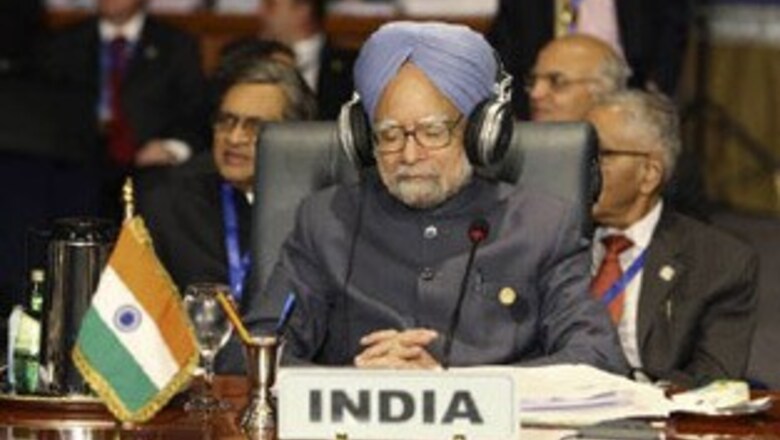
views
Sharm-el-Sheikh, Egypt: Prime Minister Manmohan Singh on Wednesday said terrorists and those who abet them must be brought to justice and urged the Non-Aligned Movement (NAM) summit to drawn up a Comprehensive Convention on International Terrorism.
Singh said that in recent years terrorist groups had become "more sophisticated, more organised and more daring".
“Terrorists and those who aid and abet them must be brought to justice. The infrastructure of terrorism must be dismantled and there should be no safe havens for terrorists because they do not represent any cause, group or religion. It is time we agree on a Comprehensive Convention on International Terrorism," he told leaders from 118 countries that comprise the NAM at the 15th summit of the movement in Sharm-el-Sheikh.
The convention will bind countries to an internationally accepted definition of terrorism and abide by a code of conduct in dealing with the issue of trans-border terrorism.
Singh, who will on Thursday meet his Pakistani counterpart Yousuf Raza Gilani on the sidelines of the summit, said that "extremism, intolerance and terrorism are our antitheses; they seek to destroy us and our movement."
Pressing for the inclusion of the developing world in multilateral bodies, the prime minister said: "Decision making processes, whether in the United Nations or the international financial institutions continue to be based on charters written more than 60 years ago, though the world has changed greatly since then.
"Developing countries must be fully represented in the decision making levels of international institutions if they are to remain effective..."
Recalling the first NAM summit of 1961, when one of the movement's founding fathers and India's first prime minister Jawaharlal Nehru had spoken of the "moral force" of the grouping, Manmohan Singh said the words held true even today.
"History has shown that non-alignment is an idea that evolves but does not fade. We must take it forward, harnessing it to meet the challenges of today," he said, amid growing scepticism on the relevance of a movement started in the Cold War era.
The relevance of NAM, he countered, had never been greater than today.
Focusing on the economic challenges ahead, he said no other NAM summit had ever "been held in an economic and financial crisis of the magnitude that now grips the world".
Though the crisis had emanated from advanced industrial economies, the "developing economies, the members of our movement, have been the hardest hit".
NAM, the prime minister asserted, had a "great stake in ensuring that steps planned to revive the global economy take into account the concerns of developing countries".
"These include the challenges of food security, energy security, the environment and the reform of institutions of global governance."
He said NAM had a "crucial stake in a rule based multilateral trading system and in an early conclusion of a balanced and fair agreement in the Doha round".
According to Singh, cooperation, trade and investment among the NAM countries could contribute significantly to reviving the world economy.
The prime minister also touched on the issue of climate change and said: "We are already making our own significant contributions in this regard, but climate change action must not perpetuate the poverty of developing countries."
NAM should be used to achieve "a comprehensive, balanced and above all equitable outcome in the ongoing multilateral negotiations, leading up to the Copenhagen conference in December this year".




















Comments
0 comment